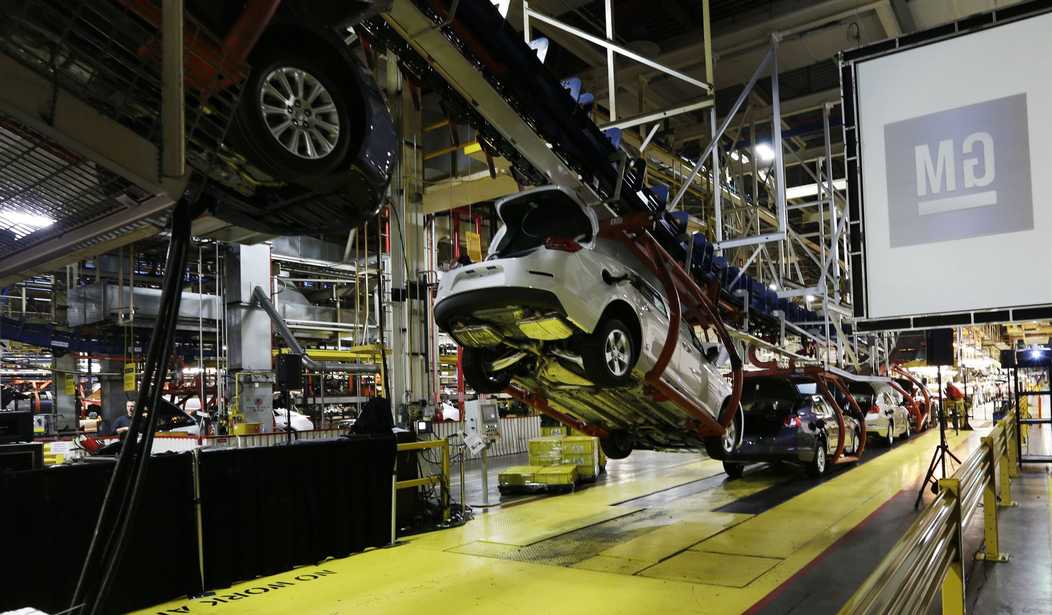It's not common for lawmakers from the polarized halls of Congress to find common ground on much these days, but there's one issue that — this week at least — brought together more than 100 House lawmakers from across the ideological spectrum to defend something many Americans don't often think twice about: their ability to tune into AM radio broadcasts.
Vespa previewed the growing questions about the future of AM broadcasting in light of major automakers' decision to begin an apparently imminent phasing out of AM radio receivers in new vehicles — beginning with 2024 models in Ford Motor Company's case. According to the carmaker, discontinuing AM capability is about "modernizing radio" to instead offer FM radio, digital and satellite broadcasts, or apps to stream stations over the internet.
But, in addition to being important for delivering conservative talk radio to Americans, the U.S. government also relies on AM radio to broadcast emergency alerts and communicate with Americans in the event of a natural disaster, attack, or other emergency. That's why, whether their reason is listening to conservative talkers or needing to alert the public to an urgent situation, both sides of the aisle are coming together to urge automakers to keep AM receivers in their vehicles.
As well as questions from Congress, the situation has brought about grassroots efforts to raise awareness of the issue from industry groups such as the National Association of Broadcasters' (NAB) "Depend on AM" campaign.
On Monday, more than 100 House members signed a letter — led by Reps. Bob Latta (R-OH) and Greg Pence (R-IN) — sent to the heads of Ford, Volkswagen, BMW, Mazda, Volvo, Tesla, Polestar, Rivian, General Motors, and Mercedes to formally express their "concern about reports" that the companies are removing or planning to remove AM radio receivers.
Recommended
Calling it "the backbone of the Emergency Alert System (EAS)," the bipartisan group of lawmakers signing on emphasized how "AM radio serves a vital role in our nation's emergency communications infrastructure."
While it might come as a surprise to some, especially younger Americans who didn't grow up when radio was the primary means of consuming audio content, the lawmakers note that "AM radio has more than 45 million listeners each month" because it is still a "go-to" source "for emergency alerts and local news, information, and weather."
The members of Congress continue:
In the case of natural disasters - tornadoes, floods, wildfires, and other local emergencies - AM radio is a lifeline. It provides early warning, up-to-the minute local information needed to survive when these disasters strike, and ongoing, life-saving information in their aftermath when the danger is often the greatest.
According to the Federal Emergency Management Agency (FEMA), over 75 radio stations, most of which operate on the AM band and cover at least 90% of the U.S. population, are equipped with backup communications equipment and generators that allow them to continue broadcasting information to the public during and after an emergency. Most importantly, AM radio is free to all Americans, not requiring a subscription or a broadband connection.
For rural Americans, the importance of having access to AM radio in their car or truck is particularly important. When Internet connectivity and cell phone service is limited or unavailable, these residents do not have as many options to access emergency information as those living in more densely populated areas. AM radio stations are often our constituents' "go to" source for information in times of crisis. We cannot deprive them of that free, life-saving resource.
With a deadline of May 26, the lawmakers requested answers to a list of questions from the automakers, including:
- from which vehicles have AM receivers already been removed?
- which vehicles are slated to have AM receivers removed?
- when will AM receivers be phased out?
- why are the AM receivers being discontinued?
- which vehicles will still have AM receivers?
- has the automaker tested technology to mitigate electric vehicle (EV) signal interference with AM receivers?
- is there technology that could be used to mitigate AM/EV interference?
- what would the cost be per vehicle to mitigate AM/EV interference?
- have any steps been taken to avoid needing to remove AM receivers from EVs? If no, why not?
- how much has the automaker received in federal loans, grants, and tax incentives over the last 15 years?
- could these government subsidies defray the cost of mitigating AM/EV interference?
- will the automaker charge a subscription fee for in-vehicle access to otherwise free AM/FM radio broadcasts?
- is phasing out AM radio part of a larger effort by the automaker to move basic vehicle features to a subscription service?
Additional lawmakers signing the letter to automakers include House GOP Conference Chairwoman Elise Stefanik (R-NY), Oversight Committee Chairman James Comer (R-KY), Rep. Kat Cammack (R-FL), and Rep. Claudia Tenney (R-NY) along with their colleagues across the aisle such as Reps. Abigail Spanberger (D-VA), Betty McCollum (D-MN), and Debbie Dingell (D-MI).

























Join the conversation as a VIP Member